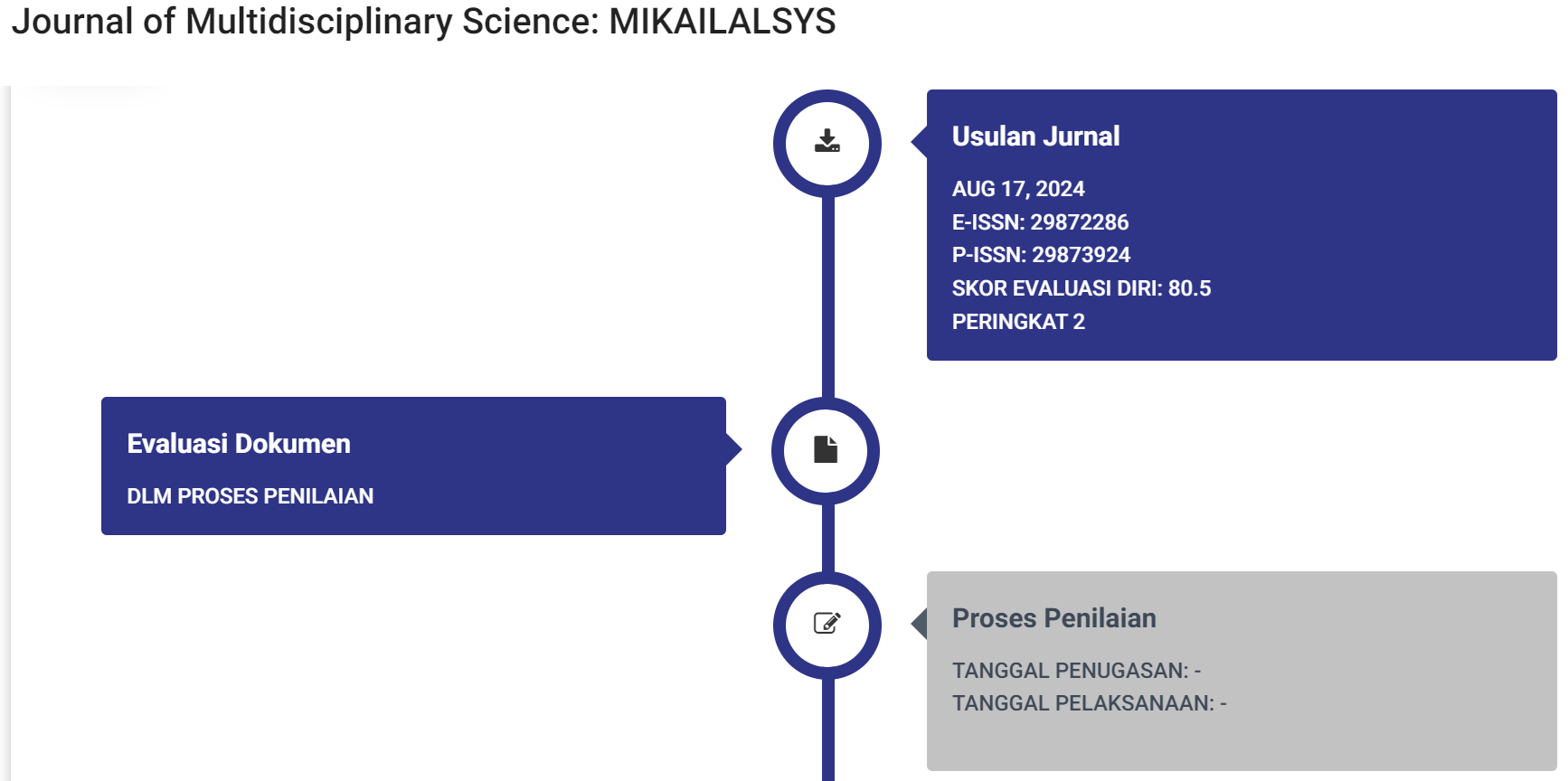Smart Grid Technologies: Advancements and Applications in Nigeria
 Digital Object Identifier:
10.58578/mikailalsys.v2i3.3777
Digital Object Identifier:
10.58578/mikailalsys.v2i3.3777
Please do not hesitate to contact us if you would like to obtain more information about the submission process or if you have further questions.

Abstract
This study explores the impact of smart grid technologies on the modernization of power grids in response to evolving energy demands and the integration of renewable energy sources in Nigeria. It aims to empirically assess advancements in smart grid technologies, focusing on four key objectives: eval_uating the impact of smart meters on energy consumption and peak demand reduction, analyzing the effectiveness of Advanced Distribution Management Systems (ADMS) in enhancing grid reliability and efficiency, assessing the role of demand response programs in balancing supply and demand, and examining the integration and management of Distributed Energy Resources (DERs) within smart grids. The research employs a quantitative methodology, collecting and analyzing data from utility companies that have implemented smart grid technologies. Key findings reveal that smart meters significantly reduce energy consumption and peak demand by providing real-time monitoring, while ADMS improves grid reliability and operational efficiency through enhanced fault detection and automated control. Demand response programs effectively balance energy supply and demand, reducing peak loads and energy costs. The integration of DERs increases renewable energy utilization and grid stability but also presents challenges related to variability in power output and management complexity. The study concludes that smart grid technologies play a crucial role in achieving a more resilient and efficient power grid, though addressing challenges related to DER integration and system management is essential for maximizing their benefits.




Citation Metrics:

Downloads

Authors retain copyright and grant the journal right of first publication with the work simultaneously licensed under a Creative Commons Attribution-NonCommercial-ShareAlike 4.0 International License that allows others to share the work with an acknowledgement of the work's authorship and initial publication in this journal.
References
Aghaei, J., & Alizadeh, M. I. (2019). Demand response in smart electricity grids equipped with renewable energy sources: A review. Renewable and Sustainable Energy Reviews, 56, 622-639.
Amin, M., & Wollenberg, B. (2020). Toward a smart grid: Power delivery for the 21st century. IEEE Power and Energy Magazine, 8(4), 34-41.
Beaudin, M., Zareipour, H., Schellenberg, A., & Rosehart, W. (2010). Energy storage for mitigating the variability of renewable electricity sources: An updated review. Energy for Sustainable Development, 14(4), 302-314.
Chen, X., Liu, Y., & Zhang, Y. (2017). Advanced Distribution Management Systems: Functionality and Implementation. IEEE Power and Energy Magazine, 15(3), 37-45.
Chen, Y., et al. (2021). Smart grid: Opportunities and challenges for future energy systems. IEEE Transactions on Industrial Informatics, 15(5), 1211-1223.
Fang, X., et al. (2019). Smart grid – The new and improved power grid: A survey. IEEE Communications Surveys & Tutorials, 14(4), 944-980.
Gharavi, H., & Ghafurian, R. (2020). Smart grid: The electric energy system of the future. Proceedings of the IEEE, 99(6), 917-921.
Gielen, D., Boshell, F., Saygin, D., Bazilian, M. D., Wagner, N., & Gorini, R. (2019). The role of renewable energy in the global energy transformation. Energy Strategy Reviews, 24, 38-50.
Gyamfi, S., Krumdieck, S., & Urmee, T. (2018). Residential peak electricity demand response—Highlights of some behavioral issues. Renewable and Sustainable Energy Reviews, 25, 71-77.
Haque, M. H., et al. (2022). Improving grid reliability using advanced distribution management systems. Electric Power Systems Research, 190, 106-115.
Hledik, R., et al. (2021). The economics of smart meter deployment. Energy Economics, 74, 193-205.
International Energy Agency. (2022). Global energy review 2022: Trends in demand and supply. Retrieved from IEA website.
Khan, I., et al. (2022). Impacts of smart meters on energy consumption and peak demand. Energy Reports, 8, 230-245.
Li, F., et al. (2019). Smart meters for power grid: Challenges, issues, and applications. IEEE Communications Magazine, 53(4), 60-68.
Li, F., Qiao, W., Sun, H., Wan, H., Wang, J., Xia, Y., & Zhang, P. (2019). Smart Transmission Grid: Vision and Framework. IEEE Transactions on Smart Grid, 1(2), 168-177.
Liu, C., et al. (2020). Application of advanced distribution management systems in electric power utilities. Journal of Power and Energy Engineering, 8, 45-55.
Lund, H., Lindgren, J., Mikkola, J., & Salpakari, J. (2015). Review of energy system flexibility measures to enable high levels of renewable electricity integration. Energy, 87, 75-86.
Miller, D., & Weaver, J. (2021). Integrating distributed energy resources into the smart grid: A comprehensive review. Renewable Energy, 168, 1242-1258.
Momoh, J. A. (2020). Smart grid design for efficient and flexible power networks operation and control. IEEE Transactions on Smart Grid, 1(1), 99-107.
Muller, R., et al. (2020). Reducing transmission losses through distributed energy resources. Energy Policy, 146, 111876.
Palensky, P., & Dietrich, D. (2011). Demand side management: Demand response, intelligent energy systems, and smart loads. IEEE Transactions on Industrial Informatics, 7(3), 381-388.
Shariatzadeh, F., Mandal, P., & Srivastava, A. K. (2015). Demand response for sustainable energy systems: A review, application, and implementation strategy. Renewable and Sustainable Energy Reviews, 45, 343-350.
Siano, P. (2020). Demand response and smart grids—a survey. Renewable and Sustainable Energy Reviews, 30, 461-478.
Wang, X., Zhang, Y., & Zhao, D. (2021). Smart Meters for Power Grid: State-of-the-Art and Future Challenges. Journal of Modern Power Systems and Clean Energy, 9(3), 479-488.
Xu, J., & Yu, Y. (2022). Enhancing Grid Reliability with Advanced Distribution Management Systems. Renewable Energy, 180, 1091-1103.
Yilmaz, H. U., Caramanis, M. C., & Ziras, C. (2021). Demand Response Program Design for Enhanced Flexibility. Applied Energy, 301, 117479.
Zhang, Z., & Chen, Z. (2021). Enhancing grid reliability with advanced distribution management systems. IEEE Transactions on Power Delivery, 36(3), 1598-1606.
Zhou, B., et al. (2019). Review of challenges and methodologies for integrating renewable energy sources into smart grids. Renewable Energy, 136, 145-154.
Zhang, W., Zhang, S., & Zhang, H. (2020). Automated Distribution Management Systems and Their Benefits to the Grid. Electric Power Components and Systems, 48(6-7), 624-633.

























